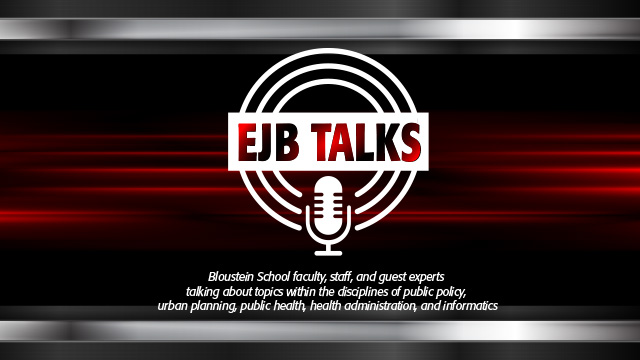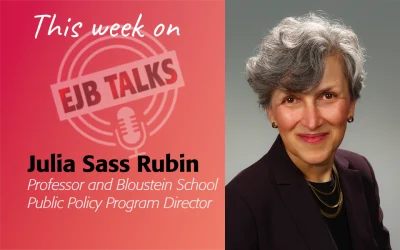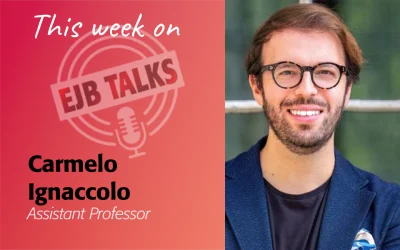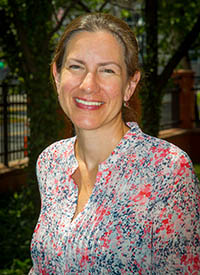
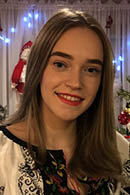
SPECIAL EDITION EPISODE 1: The war in Ukraine has stunned western observers. In this timely, special edition of EJB Talks, Stuart Shapiro speaks with two members of the Bloustein community who are personally touched by the war– undergraduate public health major Solomiya Mykolyk, and public policy professor Andrea Hetling–both of whom have family in Ukraine. Solomiya was born in Ukraine and emigrated to the U.S. with her family. She talks about the liberating impact of independence from the Soviet Union in 1991 and the Revolution of Dignity in 2014, when protesters sought to overthrow the Ukrainian government. Today the experience is much more terrifying as Solomiya describes her disbelief at hearing news of the invasion by Russia last week, reminding us that the consequences of war have a human face.
Listen to Special Edition Episode 2: The Russian Invasion of Ukraine: Putin’s Path to War with Bloustein School doctoral candidate Dr. Sergei Kostiaev.
Stuart Shapiro
Welcome to EJB Talks. I’m Stuart Shapiro, the Interim Dean of the Bloustein School, and the purpose of this podcast is to highlight the work my colleagues, our alumni, and our students in the fields of policy, planning, and health are doing to make the world, the country, and New Jersey a better place.
Today, as with the other podcast we released today, we are taking a break from our season-long theme of highlighting representatives from the Bloustein research centers to focus on the story of Russia’s invasion of Ukraine. My guests today are Solomiya Mykolyk and Professor Andrea Hetling, two members of the Bloustein community with family ties to Ukraine. Thanks to both of you so much for appearing today.
Solomiya Mykolyk
Hello, thank you for having me.
Stuart Shapiro
Let me start with you, Solomiya actually, and start by getting to know you a little bit. Can you talk about your background and the family you still have in Ukraine?
Solomiya Mykolyk
Yeah. So I was born in Ukraine, and my family got to move to the United States at the age of 11. So we have been residing here for 10 years. However, all of my family’s still back in Ukraine, kind of scattered throughout different parts, but mostly staying in the West, West Ukraine. I have a lot of family ties there. And we go back to Ukraine, often mostly in the summer. It’s very nice. But it’s also a good way to connect back with my culture and with my family and getting to see them and talk to them and seeing my cousins grow up and things like that. So it’s very nice to go back and see everything that I’m not able to see here.
Stuart Shapiro
Professor, can you talk about your connection to Ukraine?
Andrea Hetling
Sure. So unlike Solomiya, I was born here in the States. It was my grandparents that immigrated here. So I’m a second-generation Ukrainian American. And growing up in the state ties to the Ukrainian community was always very important. I have a pretty large family here in the States and actually met my husband through the Ukrainian community. So his parents were born in Ukraine. We’ve raised our kids with close ties to our Ukrainian church, to a youth organization that has a branch here in New Jersey. My husband was able to take our son to Ukraine a couple of summers ago before the pandemic and he was able to meet some of his relatives there. Like Solomiya, our family is mostly from the western part of Ukraine, in and around a city called Ivano-Frankivsk. And we’ve been able to keep in touch pretty well, until today. Where things were a little, for some reason harder to get through the phone lines. We’re hoping that that changes soon, but we’ve been in close contact with them.
Stuart Shapiro
So I’m going to direct most of my questions to Solomiya. Professor Hetling, please feel free to speak to any of them. And certainly, your voice is always welcome.
Andrea Hetling
Happy, happy to defer. And I should have said that earlier, I think Solomiya’s perspective offers a much stronger and more direct connection with events that are happening. I am happy to chime in when it relates to the Ukrainian American community here, but Solomiya, I’m also really excited and interested in having you share your perspective with the listeners.
Stuart Shapiro
Great. Well, let’s start. I think many of our listeners probably don’t know a lot of the recent history in Ukraine. And so I was hoping maybe you could put in context for us a little bit, and talk a little bit about what your family has said to you, Solomiya, about Ukraine becoming independent back in 1991?
Solomiya Mykolyk
Yes, of course. Ever since I was a child, we always talked about the Soviet Union and how it was living back there. But really, my parents always focused on telling me once Ukraine became independent and how different that was. So in 1991, is when we became independent… August 24. And I just had actually recently discussed with my dad about the feelings, and how everyone was feeling when that was announced. And he told me that everyone was so happy and this was something that a lot of Ukrainian people were waiting for. To finally have our culture, our language, our music, and our traditions, be out and open and free. And being able to practice what we wanted to and not be restrained by the Soviet regime.
Especially my dad mentioned how happy his father was, my granddad, and that this was a moment that he was waiting for, for many, many years. And it was a very exciting time for everyone. As my dad explained, when they were growing up in the Soviet Union, there was a lot of restrictions and a lot of things that they could not do. They could not leave the country couldn’t even, you know, speak our own language that we love, and we cherish. So when Ukraine became independent, it was just joy. Everyone was very happy. And everyone was very excited to finally see our country grow into something beautiful and prosperous.
I mean, that’s something nobody here really has much experience with. That complete change in the type of world you’re growing up in or the country you’re in. Going from one type of regime to a completely different one. It’s definitely a different perspective than people in this country have, even the ones that think they have it.
Stuart Shapiro
So let’s fast forward a little bit. By now, if I count, right, you’re either in the United States or about to come into the United States. And we have the Maidan Revolution, the Revolution of Dignity in 2014. What was your experience with that and your family’s experience, both here and back in Ukraine?
Solomiya Mykolyk
Yes. So when the Revolution of Dignity happened, it was only a year since we got here. So it was very scary in that sense when we first found out about the protests going on. However, it was a very important revolution for my people, because it really showed how resilient we are. Just some context of what happened, so our president at the time, was making people believe, or leading people to think that we would become a part of the European Union. Which is something that we’ve been pushing towards, to cut our ties from Russia and actually become our own independent country, not having any dependence on them and becoming a part of Europe and becoming more civilized, as you can say. And last minute, he changed it and said that we’re not going to join the European Union.
And our people were very angry, we were very angry. I remember watching the news with my parents, and that was just a shock to everyone. So it makes me really proud that this revolution started because it really shows how important it is for us to move forward, learn more. Attract people to our beautiful country that is so worth seeing. There are so many things to see. So it was really a scary time, but it was also a time where I was very proud to say that I’m Ukrainian. And very happy to show people, this is my land and this is my country. And we are… we can do anything if we want to.
Stuart Shapiro
And yeah, certainly it was another benchmark in the sort of separation between Ukraine and Russia. And unfortunately, that brings us to current times. And you used the word scary to describe your sentiments in 2014, and I can only imagine what they are like now. So to the extent you’re comfortable doing so if you could talk about your reaction to the events of the past week, and what if anything you’re hearing from people that are still in Ukraine that you’re close to.
Solomiya Mykolyk
Yes. So I remember Thursday, it was Thursday night. My mom had called me it was 1 am. And, you know, she just said Solomiya, there’s a war, they started shooting. So I remember my heart sank. And it was kind of an unreal moment where I just I was like, it’s fake. You know, it’s not happening. There’s no way you know, it’s the 21st century We’re so ahead of time, and we’re so technologically advanced and everything, but war is happening in Ukraine. And it was happening and it was true. And I had gone to sleep and I was like this is just a nightmare. Like this is not true.
And when I woke up, kind of a sad feeling sunk in. Once I started talking to my family and talking to my friends and really hearing their perspectives. And even they themselves weren’t exactly sure that it was happening. I had a friend who was like, Oh, it’s okay, like, we’re okay, day one. And then it all sunk in that this was real. My aunt, who is in Sumy right now, and that is an active war zone. And it’s been very hard to talk to her because of everything going on. And we’re just very fearful for them and their safety. And they have a little girl who’s only four. And, you know, it’s just a hard thing to explain to children what’s going on. And it’s also an unfair thing, that children have to go through this elderly have to go through this. Adults. Anyone, it’s just, it’s unfair.
That’s a lot of the feelings that the Ukrainian community is having, that this whole thing is unfair, that all we’re trying to do is just be independent, and grow into something bigger and better. And these ties to Russia are just holding us back. But also, Putin and his vision, we can say, of us being united brothers, but we’ve never been. You know, our… my country even before our independence, it’s in our history, we’ve always been fighting for freedom. And it’s a very hard thing to go through for everyone. I think it’s very tough.
Stuart Shapiro
Yeah. And again, not something that we have experienced, certainly in this country. And even in Europe, with the exception of the Balkans in the 90s. Not the type of experience that most of us in the West have been, very, fortunately, to live through. And so it’s, it’s a harder, and clearly, you’re going through a lot there.
I am a public policy person, so I always have to ask the question. What would you do, know, if you had your druthers if you were “God, Emperor” of the United States? What would you like to see the United States be doing?
Solomiya Mykolyk
You know, so I just recently became a US citizen, so now I also feel like I have more power and a bigger voice to be able to have, you know, make change happen in our country, but also have influence in other countries. And I think a really important thing, or I think one of the most important things that the United States can do for Ukraine is resources. You know, our economy has never been very rich, and we need resources. We need artillery, we need guns, maybe even training, and education. I think that that would very much help us out and our army who are fighting there right now, even without everything that we need, they’re still doing it. They’re still fighting.
But also, you know, the ultimate goal… And that’s something that a lot of Ukrainian people have been asking for, and our government has been asking for, is for NATO, to close the sky in Ukraine and enact it to be a no-fly zone. And I think the United States because of how powerful we are, and our influence in NATO, I think they can definitely have some voice, a stronger voice to voice that they should close the sky in Ukraine and help us out in that sense.
Stuart Shapiro
A lot of our listeners, of course, are not the “emperor”, the United States, but rather individuals who see the horrifying images and hear your story today, and may think to themselves, what can I do? And so what can individual people in the United States do to help out?
Solomiya Mykolyk
Yes, so a lot of people think because you’re not Ukrainian, or you don’t have a friend who’s Ukrainian, there’s not much you can do. But there’s a lot you can do. Even the simplest things such as spreading awareness are so important because so many people didn’t even know Ukraine was a country for a very long time. You know, so even spreading awareness about Ukraine. But also what is happening not sugarcoating things. It’s bad. It’s a war, we’re in a warzone. And I think it’s very important to be realistic about these events, and letting people know what is happening, that people are dying children are dying. And it’s not something to even joke about. It’s, it’s very serious. So I think awareness is one of the first things that a lot of people can do.
Additionally, a lot of the American Ukrainian community right now is hosting protests. They’re collecting resources, like medical supplies, food, clothes for children, blankets. And we’re trying very hard to gather supplies and do anything that we can, when we’re so far away, yet so close to our families, and we want to help our families and we want to help our brothers and sisters over there who are fighting for their freedom. So I think that’s, that’s a really important thing, that even attending a protest, it means so much to me when my friends come to protest, because they’re my friend, and they want to support me, and they want to support my family. So it’s very important to even come to a protest and voice yourself.
Also, reaching out to your government, your local government, your state government, it’s very important to voice your opinion write letters because they hear us. And there’s always something that they can do or say or try, that would help out the Ukrainian community.
Stuart Shapiro
From either of you, any final thoughts, anything else you’d like to share?
Andrea Hetling
I just like to say thank you, to you Stuart, to the Bloustein School for organizing this podcast kind of off-cycle and so well and timely. And so much thanks to Solomiya for coming on, and sharing your story. And really, you said how important it is to raise awareness, and you’re doing exactly that. The suggestions that you gave for how all people can be involved, I think are so important. And there are a number of organizations now collecting donations for humanitarian aid.
Both the families who are remaining in Ukraine in the shelters, and those that are choosing to take shelter in neighboring countries are going to need, as you said, food, clothing, the medical supplies, and I think everything that we can do as individuals, as well as a collective body, and I applaud the Bloustein School for becoming involved.
Stuart Shapiro
Do you have any favorite charities you’d like to mention and point people towards?
Andrea Hetling
Oh, that’s a great question. So let me uh, you might have a couple I mean, I think….
Stuart Shapiro
I have a couple if you don’t, but I’d rather hear from you….
Solomiya Mykolyk
There are a couple I think mainstream ones there’s Save a Life UA. The Ukrainian Club Rutgers is also hosting a bunch of fundraisers through RU Progressive. And those are like the two main ones. A lot of people are taking personal donations and either purchasing supplies and stuff like that.
Stuart Shapiro
That’s great. And, in addition, as I mentioned on the podcast with Sergei, which is also being released today, I mentioned a few others. And so between those and these people have a lot of choices as to where they can, where they can donate.
I tend to be someone who focuses on the geopolitical aspects of questions like this, but we must never forget that as Solomiya has so eloquently pointed out, people are dying, people are being displaced, people are terrified. So a big thank you to both of you for coming on today.
Solomiya Mykolyk
And I wanted to thank you as well for allowing me to speak about my experiences and the experiences of my community.
Slava Ukraini!
Andrea Hetling
Heroiam slava!
Stuart Shapiro
A big thank you, as always, to Amy Cobb and Karyn Olsen, who worked overtime to get these out quickly and went above and beyond the call of duty. We’ll let you digest these two podcasts and then we’ll be back in another week or so with another podcast from another expert at the Bloustein School. Until then, no matter where you are, stay safe.

